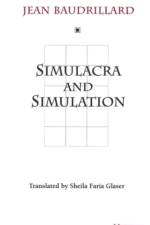av Jean Baudrillard
315,-
Jean Baudrillard’s last book was about America. His new one is about cats, Foucault, Alfa Romeas, leukemia, Catholicism, the Berlin Wall, mattresses, Laurent Fabius, Jean-Paul II, roses, Antarctica, Lech Walesa, mud wrestling, Zinoviev, porn films, snow, feminism, Rio, Jacques Lacan, Stevie Wonder, Palermo, DNA and terrorism.“Cool Memories is the other side of America, the disillusioned side, presented in the form of a diary, though not in the classical sense. I’m trying to grasp a world in all its silences and its brutality. Can you grasp a world when you’re no longer tied to it by some kind of ideological enthusiasm, or by traditional passions? Can things “tell” themselves through stories and fragments? These are some of the questions posed in a book which may seem melancholic. But then I think almost every diary is melancholic. Melancholy is in the very state of things.”



















